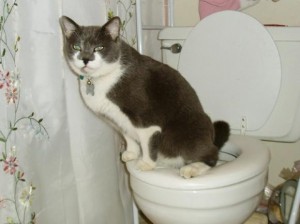Prevent Toilet Disasters: Don't Flush Cat Poop Down Your Toilet - Professional Guidance
Prevent Toilet Disasters: Don't Flush Cat Poop Down Your Toilet - Professional Guidance
Blog Article
The writer is making a number of good pointers regarding Don’t flush cat feces down the toilet in general in this article below.

Intro
As cat proprietors, it's necessary to bear in mind just how we take care of our feline close friends' waste. While it may appear hassle-free to flush feline poop down the toilet, this practice can have damaging effects for both the environment and human health and wellness.
Environmental Impact
Flushing cat poop presents unsafe microorganisms and bloodsuckers right into the supply of water, posing a substantial danger to aquatic ecological communities. These impurities can negatively influence aquatic life and compromise water high quality.
Wellness Risks
In addition to ecological problems, purging cat waste can likewise present wellness dangers to human beings. Feline feces might include Toxoplasma gondii, a parasite that can create toxoplasmosis-- a possibly extreme disease, specifically for expectant females and individuals with weakened body immune systems.
Alternatives to Flushing
The good news is, there are much safer and much more responsible means to throw away pet cat poop. Think about the adhering to alternatives:
1. Scoop and Dispose in Trash
One of the most typical technique of dealing with cat poop is to scoop it right into an eco-friendly bag and throw it in the garbage. Be sure to make use of a committed trash inside story and throw away the waste without delay.
2. Usage Biodegradable Litter
Go with naturally degradable cat trash made from materials such as corn or wheat. These trashes are environmentally friendly and can be safely taken care of in the garbage.
3. Hide in the Yard
If you have a lawn, consider hiding feline waste in an assigned area away from veggie yards and water resources. Be sure to dig deep enough to prevent contamination of groundwater.
4. Set Up a Pet Waste Disposal System
Purchase a family pet waste disposal system specifically designed for pet cat waste. These systems make use of enzymes to break down the waste, minimizing odor and ecological influence.
Verdict
Accountable pet possession prolongs beyond providing food and sanctuary-- it additionally involves appropriate waste management. By refraining from purging pet cat poop down the bathroom and going with alternative disposal methods, we can decrease our environmental footprint and secure human wellness.
Why You Should Never Flush Cat Poop Down the Toilet
A rose by any other name might smell as sweet, but not all poop is created equal. Toilets, and our sewage systems, are designed for human excrement, not animal waste. It might seem like it couldn’t hurt to toss cat feces into the loo, but it’s not a good idea to flush cat poop in the toilet.
First and foremost, assuming your cat uses a litter box, any waste is going to have litter on it. And even the smallest amount of litter can wreak havoc on plumbing.
Over time, small amounts build up, filling up your septic system. Most litter sold today is clumping; it is made from a type of clay that hardens when it gets wet. Ever tried to scrape old clumps from the bottom of a litter box? You know just how cement-hard it can get!
Now imagine just a small clump of that stuck in your pipes. A simple de-clogger like Drano isn’t going to cut it. And that means it’s going to cost you big time to fix it.
Parasitic Contamination
Believe it or not, your healthy kitty may be harboring a nasty parasite. Only cats excrete Toxoplasma in their feces. Yet it rarely causes serious health issues in the cats that are infected. Most people will be fine too if infected. Only pregnant women and people with compromised immune systems are at risk. (If you’ve ever heard how women who are expecting are excused from litter cleaning duty, Toxoplasma is why.)
But other animals may have a problem if infected with the parasite. And human water treatment systems aren’t designed to handle it. As a result, the systems don’t remove the parasite before discharging wastewater into local waterways. Fish, shellfish, and other marine life — otters in particular — are susceptible to toxoplasma. If exposed, most will end up with brain damage and many will die.
Depending on the species of fish, they may end up on someone’s fish hook and, ultimately on someone’s dinner plate. If that someone has a chronic illness, they’re at risk.
Skip the Toilet Training
We know there are folks out there who like to toilet train their cats. And we give them props, it takes a lot of work. But thanks to the toxoplasma, it’s not a good idea.

I stumbled upon that blog posting on How to Dispose of Cat Poop and Litter Without Plastic Bags while browsing the search engines. Sharing is good. You won't know, you may just be helping someone out. Thank-you for your time spent reading it.
Visit Website Report this page